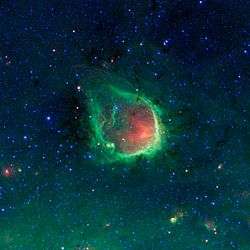RCW 120
| Emission nebula | |
|---|---|
| H II region | |
 | |
| Observation data: J2000 epoch | |
| Right ascension | 17h 12m 23.2s |
| Declination | −38° 26′ 51.2″ |
| Distance | 4,500 ly |
| Constellation | Scorpius |
| Designations |
GUM 58 Sh 2-3 Green Ring Nebula |
RCW 120 is an H II emission nebula in the southern Milky Way and located some 4,300 light-years from Earth. [1][2] Also known as Sh 2-3 and Gum 58, it is situated at Galactic coordinates 348.25°, 0.49°.
Veta S. Avedisova states that RCW 120 is ionised by the O8 V star CD -38 11636 and the B2 V star VDBH 84B, and places the nebula in the star formation region SFR 348.26+0.47 along with 3 masers and the radio HII region CH87 347.386+0.266.
The Herschel infra-red telescope's image shows an embryonic star not yet sparked by fusion which is likely to become one of the brightest stars in our Galaxy at some time within the next few hundred thousand years. It is already about ten times more massive than the Sun and is set to grow much larger by accreting surrounding gas and dust. Current theories of star formation cannot explain star masses greater than about 10 times that of the Sun, even though stars having a mass of 120 Suns are known. [3]
The RCW Catalogue, first published in 1960, is named after Alexander William Rodgers, Colin T. Campbell and John Bolton Whiteoak, who led by Bart Bok, catalogued southern nebulae while working at the Mount Stromlo Observatory in Australia.